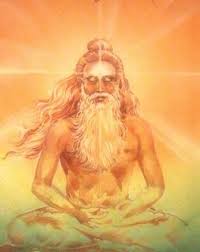Great Throughts Treasury
This site is dedicated to the memory of Dr. Alan William Smolowe who gave birth to the creation of this database.

Patañjali NULL
Indian Philosopher and Compiler of Yoga Sūtras and the Mahābhāṣya, Patañjali is a Sanskrit proper name. Several important Sanskrit works are ascribed to one or more authors of this name, and a great deal of scholarship has been devoted over the last century or so to the issue of disambiguation
"Or by surrender to God."
"Optionally, mental equanimity may be gained by the even expulsion and retention of energy."
"Otherwise he is of the same form as the thought-streams."
"Pain, despair, nervousness, and disordered inspiration and expiration are co-existent with these obstacles."
"Pain that has not yet come is avoidable."
"Perfection of the body consists in beauty, grace, strength and adamantine hardness."
"Perfection of the sense-organs and body after destruction of impurity by austerities."
"Person who is full of Fantasies, will not be able to enjoy Reality."
"Psychic powers arise by birth, drugs, incantations, purificatory acts or concentrated insight."
"Purificatory action, study and making God the motive of action, IS the Yoga of action."
"Pratyahara or abstraction is, as it were, the imitation by the senses of the mind by withdrawing themselves from their objects."
"Practice is the effort to secure steadiness."
"Posture (should be) steady and comfortable."
"Purity, contentment, austerity, self-study and self-surrender constitute Observances."
"Realization is experienced by making the Lord the motive of all actions."
"Right knowledge is inference, tradition and genuine cognition."
"Right knowledge, wrong knowledge, fancy, sleep and memory."
"Samadhi transformation is the (gradual) setting of the distractions and simultaneous rising of one-pointedness."
"Sampraj¤ata Samadhi is that which is accompanied by reasoning, reflection, bliss and sense of pure being. The remnant impression left in the mind on the dropping of the Pratyaya (content of the mind) after previous practice is the other (i.e., Asampraj¤ata Samadhi). Of those who are Videhas and Prakrtilayas birth is the cause."
"Self-control on the heart brings knowledge of the mental entity."
"Self-restraints, fixed observances, regulation of breath (Pranayama), abstraction, concentration, meditation and trance are the eight accessories of Yoga."
"Savitarka Samadhi is that in which knowledge based only on words, real knowledge and ordinary knowledge based on sense perception or reasoning are present in a mixed state and the mind alternates between them."
"Self-restraint in actions includes abstention from violence, from falsehoods, from stealing, from sexual engagements, and from acceptance of gifts."
"Sexual activity, and the thoughts and fantasies of sex, use up a great portion of our vital force. When that force is conserved through abstinence, it becomes sublimated as spiritual energy."
"Seven kinds of ultimate insight come to him (the Yogin who has acquired discriminative enlightenment). One experiences the end of 1) desire to know anything more; 2) desire to stay away from anything; 3) desire to gain anything new; 4)desire to do anything; 5) sorrow; 6) fear; 7) delusion."
"Self-restraints, fixed observances, posture, regulation of breath, abstraction, concentration, contemplation, trance are the eight parts (of the self-discipline of Yoga)."
"Steady wisdom manifests in seven stages."
"Sloth is the great enemy -- the inspirer of cowardice, irresolution, self-pitying grief, and trivial, hairsplitting doubts. Sloth may also be a psychological cause of sickness. It is tempting to relax from our duties, take refuge in ill-health and hide under a nice warm blanket."
"Success is speedy for the extremely energetic."
"That attraction, which accompanies pleasure, is Raga."
"Supreme happiness is gained via contentment."
"That [firm posture] being acquired, the movements of inhalation and exhalation should be controlled. This is pranayama."
"That is the highest Vairagya in which, on account of the awareness of the Purusa, there is cessation of the least desire for the Gunas."
"That Pranayama which goes beyond the sphere of internal and external is the fourth."
"That Kriya-yoga should be practiced for bringing about Samadhi and minimizing the Klesas."
"The application of mastery is by stages."
"That modification of the mind which is based on the absence of any content in it is sleep."
"That same meditation when there is only consciousness of the object of meditation and not of the mind is realization."
"That repulsion which accompanies pain is Dvesa."
"The argumentative condition is the confused mixing of the word, its right meaning, and knowledge."
"The association of the seer with Creation is for the distinct recognition of the objective world, as well as for the recognition of the distinct nature of the seer."
"The cause of that avoidable pain is the union of the Seer (Purusha) and seen (Prakriti, or Nature)."
"The cause of that which is to be avoided is the union of the Seer and the Seen."
"The cause of the association is ignorance."
"The cause of suffering is that the unbounded Self is overshadowed by the world."
"The cause of the avoidable is the superimposition of the external world onto the unseen world."
"The cause of the difference in transformation is the difference in the underlying process."
"The consciousness of perfect mastery (of desires) in the case of one who has ceased to crave for objects, seen or unseen, is Vairagya."
"The cessation (of desire) for dwelling in the consciousness of Atma for one who has seen the distinction."
"The contemplative transformation of this is equal-mindedness, witnessing the rise and destruction of distraction as well as one-pointedness itself."